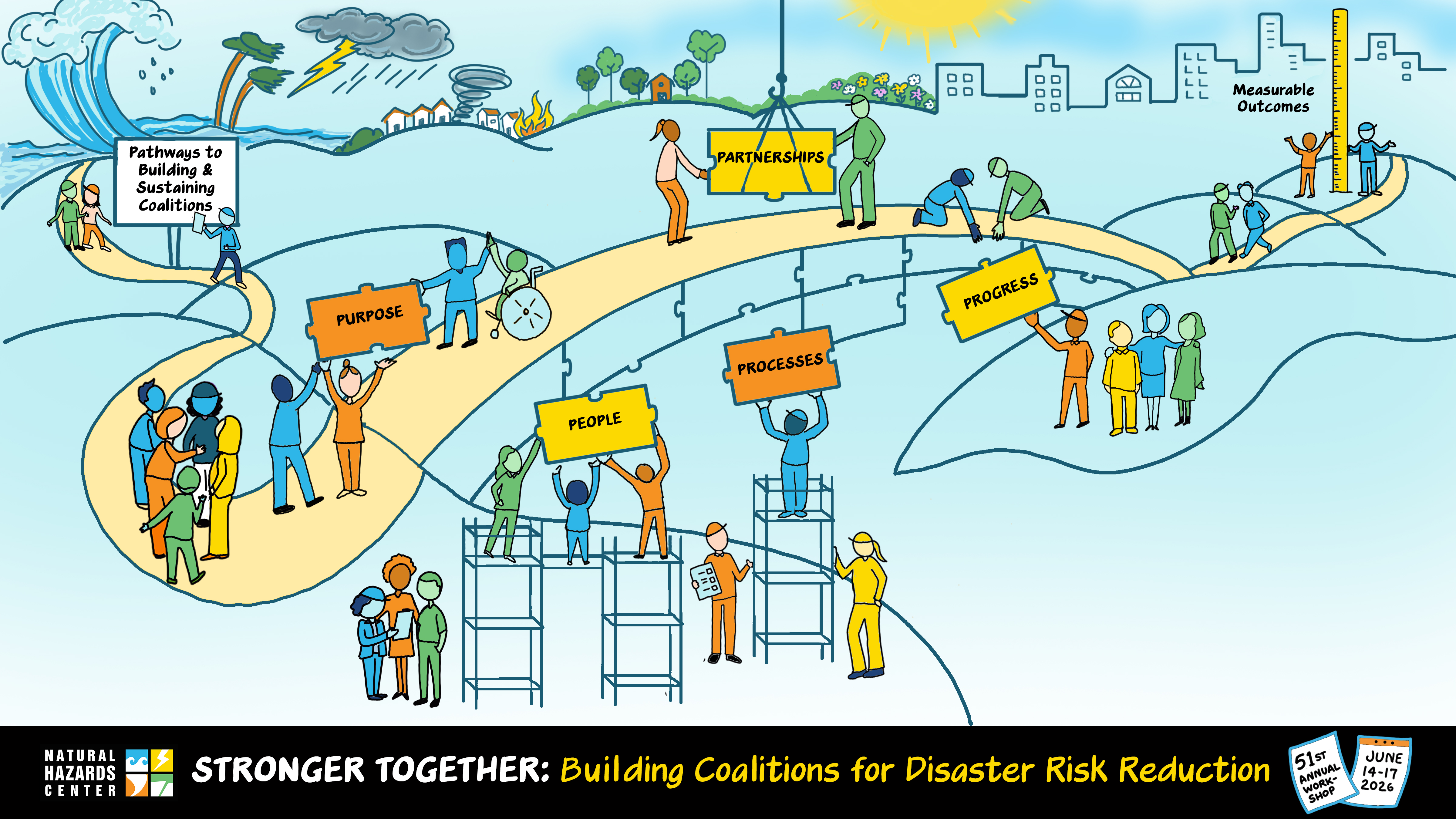Workshop Theme
Stronger Together: Building Coalitions for Disaster Risk Reduction
Register Now!
Please Click Here to register for the Natural Hazards Workshop.
Members of our field stand firm in our shared commitment to understanding and reducing disaster risk. But our work is becoming more challenging. Many of the systems designed to keep people safe are unable to keep pace with the rapid succession of floods, severe storms, wildfires, and other environmental extremes. As losses mount, our capacity to effectively manage risk is eroding.
This pivotal moment demands new, creative approaches for how we engage in disaster risk reduction and an expansion of who is involved in this work. This is why the 51st Annual Natural Hazards Research and Applications Workshop theme is Stronger Together: Building Coalitions for Disaster Risk Reduction.
Coalitions involve alliances of individuals or organizations working together to achieve a common purpose. Such alliances have always been important for garnering resources and maintaining a steady focus on disaster risk reduction. Now the role they must play is even more important, as the United States has entered an era where it is necessary for individuals, state and local governments, and other entities to assume increased responsibility for disasters.
The goal of this year’s Workshop is to identify how we can unite more people around the cause of disaster risk reduction. Attendees will learn about the pathways to building and sustaining coalitions as well as measurable outcomes that have resulted from these efforts. We hope that coalition builders from across the nation and globe will join us and share their insights and the work they are doing to save lives and protect livelihoods.
Thematic sessions at the 2026 Natural Hazards Workshop will examine several of the key components involved in coalition-building, including: purpose, people, partnerships, processes, and progress.
Purpose. Clarifying the purpose of research-, practice-, or policy-focused efforts can help rally those with different interests behind a common cause. We invite this year’s Workshop participants to share the motivations that have inspired collective efforts to prevent new risks, reduce exposure and systemic vulnerabilities, and accelerate mitigation and adaptation measures across hazard types and cultural and geographic contexts.
People. The most effective coalitions embrace a wide array of people, each of whom has unique experiences, knowledge, and skills. Every individual is like a puzzle piece. When joined together, they form a more complete picture that can help guide just, holistic, and effective solutions to the challenges we face. We look forward to hearing from Workshop attendees about the range of people involved in coalitions and the specific roles that they’ve assumed.
Partnerships. Proactively addressing risks that are widely and unevenly distributed and deeply rooted in our social systems requires partnerships that span organizational boundaries. These collaborations are also crucial in the post-disaster phase when an influx of resources can—with proper planning and consultation—make it possible to reimagine communities and make them more resistant to future shocks. We are eager to hear from those who have developed boundary-spanning partnerships involving sectors such as government, schools, business, healthcare, community- and faith-based organizations, and beyond.
Processes. Building large and inclusive coalitions requires time, trust, resources, and ethical leadership. Stories of setbacks, sacrifices, and successes can help clarify how deeply collaborative coalitions are sustained. We invite conversation concerning strategies that coalitions use to expand their power and influence in spheres ranging from local to global.
Progress. Finally, we will focus intently on the outcomes of disaster risk reduction efforts by identifying how and where progress is being made. We will spotlight disaster risk reduction programs and policies that have been implemented across communities and explore what data are being used to measure the impact of these efforts. We seek to understand what is working in the disaster risk reduction realm, and how those efforts can be bolstered.
We are excited to welcome you to Colorado on June 14-17, 2026. You are an integral part of the disaster risk reduction coalition, and we look forward to expanding it with you.
Please take care of yourself and others,
Lori Peek, Director
Natural Hazards Center
